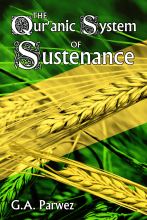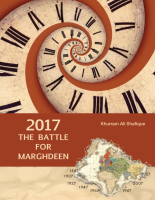Saleena Karim's Blog, page 5
November 14, 2012
Booklet on Jinnah – release in next 24 hours
This is a quick note to let you know that another translated title is going into print from tomorrow. It’s the English translation of a short Urdu book on MA Jinnah, written by GA Parwez in 1980. It also has special significance to me. I’ll explain tomorrow.
Watch this space.
November 6, 2012
Systems at a film festival

You might remember a post I wrote back in August in which I mentioned my brother Shahid Karim’s short Terminator spoof film The Procrastinator. He had just submitted it to the annual bang! film festival in Nottingham, and today he has been notified that it will be screening there on 24 November, in the Crash bang! Wallop section. Since a copy of Systems happens to make a brief appearance, it’s as good as an advert. 
If you are anywhere near Broadway Cinema from 3 p.m. onwards that day, maybe we’ll see you there!
Systems at a Film Festival

You might remember a post I wrote back in August in which I mentioned my brother Shahid Karim’s short Terminator spoof film The Procrastinator. He had just submitted it to the annual bang! film festival in Nottingham, and today he has been notified that it will be screening there on 24 November, in the Crash bang! Wallop section. Since a copy of Systems happens to make a brief appearance, it’s as good as an advert. 
If you are anywhere near Broadway Cinema from 3 p.m. onwards that day, maybe we’ll see you there!
October 20, 2012
The Qur’anic System of Sustenance – editor’s foreword
Excerpted from The Qur’anic System of Sustenance by G.A. Parwez
(trans. Saleena Karim & Fazal Karim)
FOREWORD (editor)
 Ghulam Ahmad Parwez was without doubt one of the greatest minds of the last century. In his time he was misunderstood and deemed a heretic in his own country, and his essentially rationalist approach was viewed with much suspicion in the Muslim world. Since his death in 1985 however, his popularity has steadily grown both in Pakistan and across the world. The full impact of his work has yet to be properly assessed and appreciated.
Ghulam Ahmad Parwez was without doubt one of the greatest minds of the last century. In his time he was misunderstood and deemed a heretic in his own country, and his essentially rationalist approach was viewed with much suspicion in the Muslim world. Since his death in 1985 however, his popularity has steadily grown both in Pakistan and across the world. The full impact of his work has yet to be properly assessed and appreciated.
My father (Fazal Karim) and I feel honoured to have had the opportunity to translate Parwez’s seminal work, Nizam-e-Rabbubiyat, into English. The Urdu title literally translates to System of (Universal) Sustenance, but over the years among those discussing his work in English it has wrongly been referred to as the ‘Qur’anic Economic System’, which is not only a misnomer, but also exposes a gross misinterpretation of Parwez’s thought. Although this book discusses communism and capitalism in light of Qur’anic principles, and, notwithstanding the fact that Parwez describes this book as a ‘monograph on the subject of economics’ [1], it is fair to say that it does not, as such, present a purely economic system with the mere aim of meeting material needs. Whereas the very word ‘economy’ implies an acceptance of the scarcity principle, the Divine principles of sustenance cannot be characterised together as ‘economy’, being based on the Qur’an’s self-attested principle of ‘abundance’. Nor should the Urdu word nizam (system) in the title be taken to mean a closed system. On the subject of the word deen (usually translated as ‘religion’), Parwez has stated elsewhere that whilst ‘way of life’ (or ‘system’) is the closest meaning of the Arabic, even this is insufficient. Deen certainly is a systemic word, but it does not literally translate to ‘system’. Since (to paraphrase Parwez) Islam as a deen equates to the Divine process of sustenance (Rabbubiya) at work throughout the universe, [2] his chosen Urdu word nizam likewise does not point to a fixed system, but to a set of principles taken together as a whole.
Moreover, this book is really an attempt to delineate the Qur’anic method of meeting human needs in their entirety – both material and ‘spiritual’. Parwez himself remarks in Chapter 4: ‘Meeting our physical needs is a means to an end, and not an end in itself’. Again in Chapter 8, he writes: ‘The higher purpose of the Divine system of sustenance is not just to meet the physical needs of people. Indeed, meeting physical needs is only a rudimentary and superficial aim. From the Qur’anic perspective this is only a step in the direction of life’s true purpose, which is to develop and perfect the self, and this can be achieved only by enacting the principle of universal sustenance’.
In short, Parwez has tried to show that the Divine system of sustenance not only serves to rewrite the generally accepted rules of economy, but also those of human society, and by extension, of reality. While there are those who would view Parwez’s views as utopian and unrealistic, he was inspired by the Qur’anic line that it is all ‘easy for God’ (as mentioned in Chapter 8 of this book) – suggesting that what may seem difficult in view of humanity’s present mindset would in fact be very easy for a nation that understands the Divine Message.
The translation
This is a translation of the 1978 edition with minor editorial revisions and additions made by the translators solely for the purpose of clarifying the content of the main text. We have also added footnotes (all marked Translators’ note), again to either expand upon or clarify statements made in the original Urdu text.
The chief difference between the original 1955 and 1978 editions was the addition of some appendices by Parwez, namely: Islami Socialism (Islamic Socialism), 2) Jahaan Marx Na-Kaam Reh Geya (Where Marx Failed), Mao Tse Tung aur Qur’an (Mao Tse Tung and the Qur’an: A Comparison) and Riba ke Behs (The Debate Over Interest). As these titles suggest, Parwez wrote these appendices mainly to address communism, which was still operational in both Russia and China at the time. Since then communism has essentially failed worldwide (even China, while technically remaining a communist state, is behaving increasingly like a modern capitalist state in practice), and so the content of these appendices is no longer relevant to the present economic climate. For this reason we have not reproduced them. However we have translated two important sections on zakaat and riba from the third of Parwez’s appendices, Riba ke Behs, and included it as a short additional chapter, inserted before the Afterword.
When it comes to quotes from the Qur’an, we have taken the liberty of inserting well-known English translations (slightly edited to modernise the English) wherever Parwez has referred to particular verses and reproduced the Arabic. Parwez’s approach (as he explains in his Preface to the 1978 edition, also reproduced in this book) was to translate meaning for meaning (exposition) rather than translate literally word for word. This is because literal translations sometimes fail to convey the full meaning of the Qur’anic text – a fact universally acknowledged by all translators of the Qur’an. Nevertheless, wherever the meaning of Parwez’s expositional translation is close to a traditional version, we have seamlessly combined the two. This has the added benefit of showing the reader how to better understand literal translations. At other times, Parwez’s expositional text is either included in the main text immediately following the traditional quotations, or occasionally part of it appears in footnotes.
We would like to express our heartfelt thanks to Mr Maqbool Mahmood Farhat of Ilford, Essex, who went to a great deal of trouble in locating the vast majority of the references in this book. Some of the works were not fully referenced in the original Urdu text, which made the task of locating them that much more difficult. To Mr Farhat goes the credit of saving us much time in this area.
Finally, it goes without saying that no translation is ever truly perfect, and so we end by saying that any deficiency in this translation is ours and ours alone.
Saleena Karim, Nottingham, UK
15 July 2012
Footnotes
[1] See Parwez’s Preface to the 1978 edition. In fact it seems he wrote this line only because he had added three appendices on economic subjects.
[2] See end of Chapter 1.
The Qur’anic System of Sustenance – Editor’s Foreword
Excerpted from The Qur’anic System of Sustenance by G.A. Parwez
(trans. Saleena Karim & Fazal Karim)
FOREWORD (editor)
 Ghulam Ahmad Parwez was without doubt one of the greatest minds of the last century. In his time he was misunderstood and deemed a heretic in his own country, and his essentially rationalist approach was viewed with much suspicion in the Muslim world. Since his death in 1985 however, his popularity has steadily grown both in Pakistan and across the world. The full impact of his work has yet to be properly assessed and appreciated.
Ghulam Ahmad Parwez was without doubt one of the greatest minds of the last century. In his time he was misunderstood and deemed a heretic in his own country, and his essentially rationalist approach was viewed with much suspicion in the Muslim world. Since his death in 1985 however, his popularity has steadily grown both in Pakistan and across the world. The full impact of his work has yet to be properly assessed and appreciated.
My father (Fazal Karim) and I feel honoured to have had the opportunity to translate Parwez’s seminal work, Nizam-e-Rabbubiyat, into English. The Urdu title literally translates to System of (Universal) Sustenance, but over the years among those discussing his work in English it has wrongly been referred to as the ‘Qur’anic Economic System’, which is not only a misnomer, but also exposes a gross misinterpretation of Parwez’s thought. Although this book discusses communism and capitalism in light of Qur’anic principles, and, notwithstanding the fact that Parwez describes this book as a ‘monograph on the subject of economics’[1], it is fair to say that it does not, as such, present a purely economic system with the mere aim of meeting material needs. Whereas the very word ‘economy’ implies an acceptance of the scarcity principle, the Divine principles of sustenance cannot be characterised together as ‘economy’, being based on the Qur’an’s self-attested principle of ‘abundance’. Nor should the Urdu word nizam (system) in the title be taken to mean a closed system. On the subject of the word deen (usually translated as ‘religion’), Parwez has stated elsewhere that whilst ‘way of life’ (or ‘system’) is the closest meaning of the Arabic, even this is insufficient. Deen certainly is a systemic word, but it does not literally translate to ‘system’. Since (to paraphrase Parwez) Islam as a deen equates to the Divine process of sustenance (Rabbubiya) at work throughout the universe,[2] his chosen Urdu word nizam likewise does not point to a fixed system, but to a set of principles taken together as a whole.
Moreover, this book is really an attempt to delineate the Qur’anic method of meeting human needs in their entirety – both material and ‘spiritual’. Parwez himself remarks in Chapter 4: ‘Meeting our physical needs is a means to an end, and not an end in itself’. Again in Chapter 8, he writes: ‘The higher purpose of the Divine system of sustenance is not just to meet the physical needs of people. Indeed, meeting physical needs is only a rudimentary and superficial aim. From the Qur’anic perspective this is only a step in the direction of life’s true purpose, which is to develop and perfect the self, and this can be achieved only by enacting the principle of universal sustenance’.
In short, Parwez has tried to show that the Divine system of sustenance not only serves to rewrite the generally accepted rules of economy, but also those of human society, and by extension, of reality. While there are those who would view Parwez’s views as utopian and unrealistic, he was inspired by the Qur’anic line that it is all ‘easy for God’ (as mentioned in Chapter 8 of this book) – suggesting that what may seem difficult in view of humanity’s present mindset would in fact be very easy for a nation that understands the Divine Message.
The translation
This is a translation of the 1978 edition with minor editorial revisions and additions made by the translators solely for the purpose of clarifying the content of the main text. We have also added footnotes (all marked Translators’ note), again to either expand upon or clarify statements made in the original Urdu text.
The chief difference between the original 1955 and 1978 editions was the addition of some appendices by Parwez, namely: Islami Socialism (Islamic Socialism), 2) Jahaan Marx Na-Kaam Reh Geya (Where Marx Failed), Mao Tse Tung aur Qur’an (Mao Tse Tung and the Qur’an: A Comparison) and Riba ke Behs (The Debate Over Interest). As these titles suggest, Parwez wrote these appendices mainly to address communism, which was still operational in both Russia and China at the time. Since then communism has essentially failed worldwide (even China, while technically remaining a communist state, is behaving increasingly like a modern capitalist state in practice), and so the content of these appendices is no longer relevant to the present economic climate. For this reason we have not reproduced them. However we have translated two important sections on zakaat and riba from the third of Parwez’s appendices, Riba ke Behs, and included it as a short additional chapter, inserted before the Afterword.
When it comes to quotes from the Qur’an, we have taken the liberty of inserting well-known English translations (slightly edited to modernise the English) wherever Parwez has referred to particular verses and reproduced the Arabic. Parwez’s approach (as he explains in his Preface to the 1978 edition, also reproduced in this book) was to translate meaning for meaning (exposition) rather than translate literally word for word. This is because literal translations sometimes fail to convey the full meaning of the Qur’anic text – a fact universally acknowledged by all translators of the Qur’an. Nevertheless, wherever the meaning of Parwez’s expositional translation is close to a traditional version, we have seamlessly combined the two. This has the added benefit of showing the reader how to better understand literal translations. At other times, Parwez’s expositional text is either included in the main text immediately following the traditional quotations, or occasionally part of it appears in footnotes.
We would like to express our heartfelt thanks to Mr Maqbool Mahmood Farhat of Ilford, Essex, who went to a great deal of trouble in locating the vast majority of the references in this book. Some of the works were not fully referenced in the original Urdu text, which made the task of locating them that much more difficult. To Mr Farhat goes the credit of saving us much time in this area.
Finally, it goes without saying that no translation is ever truly perfect, and so we end by saying that any deficiency in this translation is ours and ours alone.
Saleena Karim, Nottingham, UK
15 July 2012
Footnotes
[1] See Parwez’s Preface to the 1978 edition. In fact it seems he wrote this line only because he had added three appendices on economic subjects.
[2] See end of Chapter 1.
October 19, 2012
A new book with ‘system’ in the title – out now
 Recently I announced that Libredux Publishing was about to release a book in collaboration with another organisation (Tolu-e-Islam, Lahore). The book is out now in paperback, and its title is: The Qur’anic System of Sustenance, the long-awaited English translation of G.A. Parwez’s Nizam-e-Rabbubiyat (1955). That makes it the second Libredux book with the word ‘system’ in the title.
Recently I announced that Libredux Publishing was about to release a book in collaboration with another organisation (Tolu-e-Islam, Lahore). The book is out now in paperback, and its title is: The Qur’anic System of Sustenance, the long-awaited English translation of G.A. Parwez’s Nizam-e-Rabbubiyat (1955). That makes it the second Libredux book with the word ‘system’ in the title. 
The book has just become available at CreateSpace, and should also become available at Amazon within the next week. I will reproduce the editor’s foreword in my next post. In the meantime, allow me to introduce its author.
Ghulam Ahmad Parwez – not to be mixed up with the founder of Ahmadism, Mirza Ghulam Ahmad – was a non-sectarian Muslim thinker with a rationalist approach to Islam. He was born in British India in 1903 and was an activist of the Pakistan movement. He was an associate of Dr. Iqbal; and it was at Iqbal’s suggestion that he set up his monthly journal Tolu-e-Islam in 1938, which is still in print today. He was also an adviser to M.A. Jinnah, the founder of Pakistan. Parwez received a posthumous Tehrik-e-Pakistan (Pakistan Movement) Gold Medal for his services in 1989. But he is best known for his outspoken views on religion, which he considered to be the antithesis of true Islam – and an obstacle in the way of unlocking humanity’s full potential.
Controversy with a capital ‘S’

G.A. Parwez (1903-85)
Parwez wrote numerous books and articles, including the aptly-titled Islam: A Challenge to Religion (his only title originally written in English), a 4-volume lexicon of the Quran (Lughat ul Quran), and a 3-volume expositional and scientific translation of the Quran (Mufhoom al Quran). But perhaps his most important work was Nizam-e-Rabbubiyat (1955), which translates literally to ‘system of (universal) sustenance’. When my father and I translated this book, we changed the title to include the word ‘Quranic’ because the word Rabbubiyat is derived from one of the names of God (Rabb) in the Quran. At the time of its release, the book generated a lot of controversy. Some suggested that his book was a thinly-disguised communist manifesto, due to his anti-capitalist views and the fact that his proposed ‘system’ had a somewhat socialist bent. But in fact Parwez was opposed to both capitalism and communism on the grounds that they are purely materialistic and reject the spiritual (just as he was opposed to religion on the grounds that it is purely spiritualistic and rejects the material).
A misnomer
Parwez said he was actually offering a Quran-inspired economic system as a third alternative to both. But was he really talking about an economic system? Not at all. It would take me far too long to explain why in this post – and anyway, it’s covered in the foreword that will appear here soon. But suffice it to say that what makes Parwez’s proposed ‘system’ different from capitalism and communism is that it is not confined to the material. In other words, it covers more than just economy. The ‘system of sustenance’ presented by Parwez should be understood in much the same way as I have described ‘Libredux’ in Systems - as an open-ended structure distinguished only by the universal ideals at its core. To borrow Parwez’s words, this type of ‘system’ is a means to an end, and not an end in itself.
And what is that end?
The answer is in this very post. Tell me if you spotted it.
Postscript: To celebrate the launch of this title, it will be made available at a reduced price for a limited time. Details to follow in my next post.
October 9, 2012
Can sci-fi redefine our political system?
 Completely by accident this morning I have seen a post at the Science Fiction & Political Thought blog that briefly reviews my novel. The blog’s name is pretty self-explanatory. Its author, Dadrocant, is interested in exploring the links between sci-fi and political thought. In his latest post, ‘Can Science Fiction help us redefine our political system?‘, he mentions Systems as an example of sci-fi that questions whether or not democracy really is the best possible political system. This passage from that post caught my attention:
Completely by accident this morning I have seen a post at the Science Fiction & Political Thought blog that briefly reviews my novel. The blog’s name is pretty self-explanatory. Its author, Dadrocant, is interested in exploring the links between sci-fi and political thought. In his latest post, ‘Can Science Fiction help us redefine our political system?‘, he mentions Systems as an example of sci-fi that questions whether or not democracy really is the best possible political system. This passage from that post caught my attention:
The center dilemma of this story lies in a social experiment simulation conducted 20 years before the events of the book, where several political systems are put to the test in a comparison, and even though there is no explanation as to what exactly the ideal system that is the center of the test [Libredux] is exactly like, it does hint at some interesting points, which can be seen today in some of the discourses from those who are discontented about the current state of affairs in western democracies …
That, of course, is the point Systems attempts to make. There is no such thing as a fixed ideal system. The distinguishing characteristic of an ideal system is that it is never fixed. That’s why you won’t find a blueprint for the Libredux model in Systems. And for any Pakistanis reading this post, this should be big clue as to why Iqbal also never offered any sort of blueprint for an ideal political system, and why even that epitome of pragmatism, Mr Jinnah, was supposedly ‘vague’ about what Pakistan’s system would be like. 
So, does Systems question democracy? Yes, it questions the modern democratic state – just as it questions all fixed ideologies – but not democracy in principle, which is based on both the ideals of liberty and justice. In fact, I always assumed that the Libredux model would likely be set up as some sort of democracy and evolve from there, in line with what I have said in SJ2 about ideal systems being able to develop by using any contemporary polity as a starting point. To reiterate: A ‘Libredux’ system would be one that theoretically takes the shape of almost any system, as long as it was fit to survive in the conditions of its time, and it retained its ideals (as per the theorem). Like a living organism, its body or structure can take any shape but its ethical DNA remains ultimately the same. I wrote this in an earlier draft of the manuscript for Systems – in its long-winded synopsis, actually - but it never made it into the final version of the novel. I didn’t want too much technical stuff to get in the way of the story.
The whole post on sci-fi as a medium for exploring future political systems can be found here.
October 7, 2012
A new Libredux title – again!
In the next week or so Libredux Publishing is going to release a new title – this time in association with another publisher (a literary organisation that I will introduce in another post).
My father and I were commissioned to translate an Urdu book last year, and I offered to also help put into print (since I already had prior indie publishing experience, and had also published a few books for another author). At the time, Libredux Publishing had not yet come into existence. Now it is the named publisher.  This means that Libredux will now have three titles to its name in the space of just one year. Not bad for an imprint that I only technically set up for Systems!
This means that Libredux will now have three titles to its name in the space of just one year. Not bad for an imprint that I only technically set up for Systems!
Oh, actually, make that four titles. It so happens that we’ve translated two titles for the aforementioned organisation.
More soon.
September 13, 2012
2017: The Battle for Marghdeen – paperback out now
 And now … it’s out! Libredux Publishing is proud to announce that the paperback edition of Khurram Ali Shafique’s book, 2017: The Battle for Marghdeen, has gone into print today, and is already available for purchase here. It will become available at Amazon soon as well, probably by next week. Ebook is available here.
And now … it’s out! Libredux Publishing is proud to announce that the paperback edition of Khurram Ali Shafique’s book, 2017: The Battle for Marghdeen, has gone into print today, and is already available for purchase here. It will become available at Amazon soon as well, probably by next week. Ebook is available here.
If you read this short but powerful book, please send me your reviews, or post them at Amazon.
Intro from the back cover follows.
***
Marghdeen is an ideal society conceived by Dr. Sir Muhammad Iqbal (1877-1938), a foremost thinker of modern times. It is a world where life is inside-out, people know their destinies and there is no poverty, neediness, crime or injustice.
In 2017: The Battle for Marghdeen, the author shows how such a society can be achieved in a short space of time, as long as we are prepared to change our perception about the world we live in. The book presents the basic principles for achieving Marghdeen, illustrated with examples from modern history. There is a special emphasis on societies that already acknowledge Iqbal as their thinker, but these principles can be applied anywhere in the world.
***
One of the finest achievements of the human mind is to see, to understand, and to put the things seen and understood into a greater perspective. With Khurram Ali Shafique, some kind of thinking of the heart has returned into the arena: a greater perspective, so to speak. – Dr. Thomas Stemmer
September 6, 2012
2017: The Battle for Marghdeen – paperback release soon
I’m pleased to announce that Khurram Shafique’s 2017: The Battle for Marghdeen, which was released by Libredux Publishing on 14 August 2012, is about to be released in paperback. Date to be confirmed, but likely to be in a few days. Watch this space for updates.



